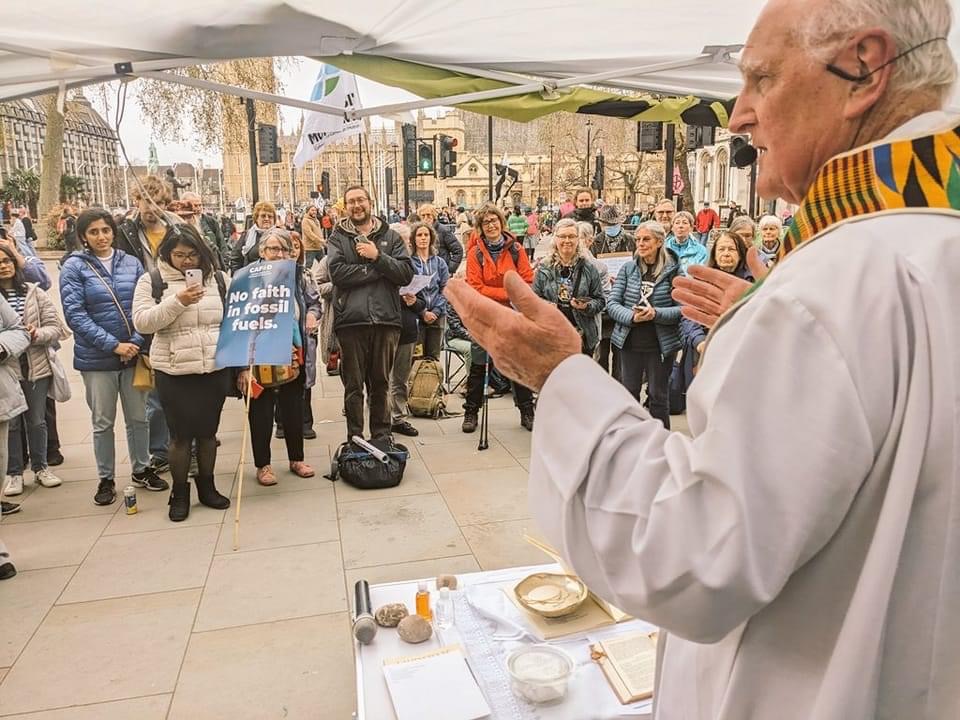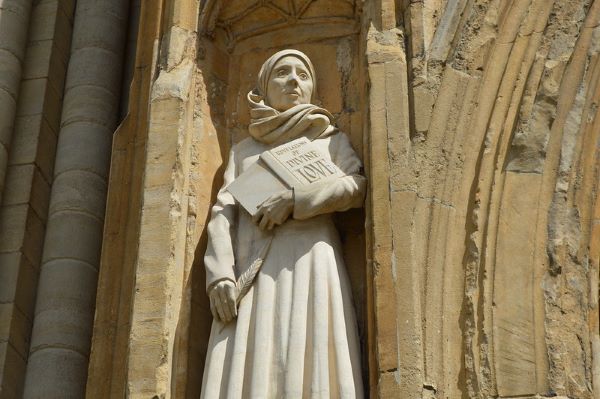Sitting in the Octagon Unitarian Chapel, Norwich, listening to Dr Nicholas Groves on Friday morning (best known, perhaps, for his books on parish churches), I couldn’t but give thanks for the spread of Julian of Norwich’s words she wrote in response to Jesus’ love.
The words written at a time of deep crisis – plague and the ensuing anxiety, fear, and desperation – were brought together to form one of the greatest works of spirituality written during the Middle Ages: Revelations of Divine Love.
And it was so refreshing for men and women of Julian’s time to hear about love and the hope that that love engendered. The first wave of the “Black Death” (words of the 1750s, the proper name for the pandemic) spread when Julian was 5 or 6 years old. Five more cycles of plague swept through Norwich during Julian’s lifetime, together with drought, fighting, and famine.
The plague lasted from 1346 to 1353, the most fatal pandemic recorded in human history, causing the deaths of around 200 million people, creating religious, social and economic upheavals. There was much need for hope.
The Rt Revd Graham Usher, Bishop of Norwich, writes in his Foreword to my most recent book, Julian of Norwich’s Literary Legacy (Darton, Longman and Todd 2023): “During the heights of the Coronavirus pandemic I was struck by how many people drew on the writings of Julian of Norwich to find solace at times of national as well as personal anxiety.”
He continues: “Perhaps that was because Julian’s writings help us pause from the pressures and uncertainties of contemporary life. Might her words carry a resonance down the centuries about how to live well amongst so much angst?
“This best-selling medieval author continues to reach new audiences from around the world, encountering in her writing a hope-filled life.”
Perhaps they do. Certainly, the singing, prayer, and readings brought together for the “Celebrating the 650th anniversary of Julian of Norwich” service offered a much-needed focus on God’s love and the hope that can be found through that love, “How,” in fact, “live well.”
It is the 650th year since Julian experienced a series of visions or “showings” of the Passion of Christ. In 1373, on 8 or 13 May (the manuscript is unclear here), at the age of 30, Julian became so seriously ill that she thought she was going to die.
Her local priest and an acolyte were summoned to her deathbed, placing a crucifix before Julian’s face and urging her to “look upon it and be comforted by it, in reverence of him who died for you and me”.
Alongside the corporeal sight of Christ crucified, she received a spiritual sight of his intimate love. She writes: “He is our clothing, for love enfolds us and wraps us, embraces and encloses us, surrounds us for tender love, that he may never desert us.”
Julian recovered from her illness and wrote two accounts of her experiences; the earlier, shorter one was completed soon after her recovery, the second, longer one was written much later. In the latter she meditates more deeply on God’s revelations – visual and aural – that he gives to her.
Julian of Norwich’s Literary Legacy is my tenth book – my sixth published by DLT and the third on Julian. During its course, “Julian’s writing is systematically studied, drawing attention to her linguistic, rhetorical, and stylistic brilliance which, independently and together, shed light on problems with which twenty-first-century readers with a different reading mindset and practice are presented.”
I hope I may “bring richer meaning to Julian’s words for those who know them well and assist understanding for those discovering them for the first time, perhaps seeking wisdom and comfort in challenging circumstances or to deepen their prayer life”.
Luke Penkett was erstwhile librarian and archivist at the Julian Centre for a number of years and is now curator of the Margery Kempe Centre in King’s Lynn Minster, honorary secretary of the Margery Kempe Society and book reviews editor for Medieval Mystical Theology.



 Loading ...
Loading ...
What do you think?
You can post as a subscriber user ...
User comments (0)